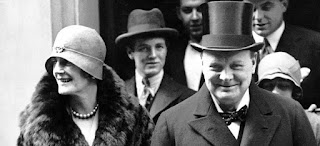HEROES THROUGH A MODERN FILTER
The heroes of yesterday were rugged, unforgiving, and victorious. The majority of early leaders got to their positions of power by whatever means necessary. They were outspoken, abrasive, and even violent, but during that day and age, those qualities were revered. Those were the qualities successful men had. However, as time marches on, many individuals argue that these heroes are undeserving of our adoration and/or attention because of their behavior. Are these people putting a modern filter on the actions of yesteryear and trying to reprehend history instead of embracing the past?
In today’s modern age, many of our traditional heroes are being attacked. Winston Churchill, the man heralded by many as the “man of the century,” is now criticized by his detractors as a racist. As a young lady, my father explained to me, “Had it not been for Winston Churchill, we would all be speaking German today.” Indeed, Churchill stood up to the tyrant Adolf Hitler, while his parliamentary contemporaries wanted to “sue for peace.” As a result, the Tory party replaced British Prime Minister, Neville Chamberlain, with Winston Churchill, and with the support of the king and ultimately his party, Great Britain and the western world triumphantly defeated “the axis of evil.” Nevertheless, as many point out, Churchill had a dark side. “I hate Indians,” he once trumpeted. “They are a beastly people with a beastly religion.” And so therein lay the contradiction-the man who dared stand up to Hitler, and galvanized the world to ultimately follow his lead, nevertheless did so by whatever means necessary. Should his success be belittled in today’s society because he would be deemed racist? Following this bandwagon, General Patton, a man instrumental in leading U.S. forces during WWII, is today criticized as a bad husband, an uncaring father, and insensitive to soldiers bludgeoned by war and inflicted with PTSD. Patton had a hard-driving personality and a strong disbelief in the medical condition “combat stress reaction,” also then called “shell shock.” Should his lack of compassion for the people around him discredit the success he had in the military?
It is not only men that are in danger of the scrutiny of today’s society. Eleanor Roosevelt is criticized by the LGBT community for being a closeted lesbian. Jacqueline Kennedy is criticized for truly achieving nothing except dressing well and “riding on the coattails of her husband.” Even the memory of the beloved Princess Diana is under siege. As a young lady, Princess Diana represented my role model of choice and is still significant in my life today. While navigating puberty, anxiety, depression, and teenage rebellion, my role model provided a much needed stabilizing factor. Today, her loving nature and forgiving heart are still ideals I try to emulate. My dreams and future plans are still influenced by her; indeed, even my vacations to Europe reflect her spirit. Without the role model of Princess Diana in my life, I would not be the person I am today. With all of this historical revision occurring, it is daring us to take a closer look at our heroes. Should we hold history to today’s standards?
The young girl who would listen to her father’s stories about the bravery of Winston Churchill is now a grown woman leading a digital marketing company. Shaped by the stories of my youth, and influenced by the role model of my choice, I am proud of who I am and what I have accomplished. The theme of my life has been greatly influenced by many of the traditional heroes of the past and present. Young men and women growing up in the contemporary world face a plethora of challenges. From broken families, and drug addiction, to other modern day stresses, traditional role models often provide an outline for how to live one’s life well. While this is most certainly a personal choice, one can argue that the very fabric of our society, and daresay, our being, is the result of stories passed down through the generations. In a world full of troubles, for many, they represent a beacon of light. If we destroy our heroes, one can argue that we have very little left. It can be said that everyone and everything has a dark side of some sort. No one is downy white, and the world comes in shades of gray. We would do well to remember this when judging those from the past with the ideals of today. I for one am willing to look past the dark side of my role models. Instead, I choose to look toward their inherent goodness and be aware that, like my role model, I too am inherently flawed… and for me, that is okay.


Comments
Post a Comment